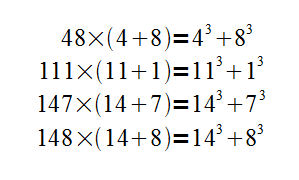Gauss’ scientific diary was a great boon to mathematical historians, but his notes could be frustratingly cryptic. On July 10, 1796, he made this entry:
ΕΥΡΗΚΑ! num = Δ + Δ + Δ
He had discovered that every positive integer is the sum of at most three triangular numbers.
Among the 146 entries, two remain completely opaque. On Oct. 11, 1796, Gauss had written:
Vicimus GEGAN.
And on April 8, 1799:
![]()
No one knows what either of these means — if they had mathematical significance, it was lost with Gauss.
So it goes. Dirichlet was famously uncommunicative, not even informing his family that his wife had given birth. His father-in-law later complained that he “should at least have been able to write 2 + 1 = 3.”



